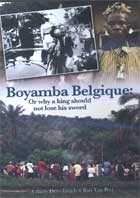
Boyamba Belgique: Or Why a King Should Not Lose His Sword 2010
Distributed by Icarus Films, 32 Court St., 21st Floor, Brooklyn, NY 11201; 800-876-1710
Produced by Ellen De Waele
Directed by Dries Engels and Bart Van Peel
DVD, color, 57 min.
College - General Adult
African Studies, Colonialism, Congo, Cultural Anthropology, History
Date Entered: 02/15/2012
Reviewed by Dennis J. Seese, Reference Librarian, American UniversityBoyamba Belgique documents the journey of two Belgian journalists as they try to decipher the mystery shrouding the young Congolese man, immortalized in Robert Lebeck’s iconic photograph, who proudly strode up to King Baudouin’s farewell motorcade on the eve of Congolese independence in June 1960, and calmly assumed the king’s sword. Lebeck’s photograph, a direct lineal precursor of the “Tank Man” photographed in Tiananmen Square, captures a courageous historical act imbued with incredible symbolic power.
As the filmmakers discover, the symbolism of the act splintered into a multiplicity of interpretations, each valid yet fraught with often paradoxical meanings that traverse the grey areas between cultural mythology and political significance. The attempt to probe the expansive grey area between myth and politics in the Democratic Republic of the Congo, further complicated by the Colonial enterprise, is perhaps the key exploration undertaken by the filmmakers as they journey from the National Archives in Kinshasa through remote rural villages searching for the identity of the man in the photograph. They follow a series of leads provided by anthropologists, missionaries and political and tribal figures that ultimately reveal fascinating things, such as the cultural explication of the power embodied by the sword in the Congolese myth and folklore, while the identity of the man in the photograph remains elusive. The aforementioned visit to the National Archives provides one of the most poignant scenes in the film as it explicitly illuminates the cultural damage wrought by lengthy colonial control over a colonized state’s archives, a crucial issue underpinning much recent post-colonial historiography, humanized hauntingly in this understated scene. The filmmakers eventually solve the mystery provoked by the photograph and the emotional power of its revelation is striking.
Boyamba Belgique is taut and technically seamless, moving at a swift pace through dense thickets of Congolese history, while providing the viewer a valuable, panoramic glimpse of the nation’s rich culture as it struggles to move beyond its troubled past.